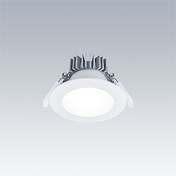Cetus / CETUS3 S LCS HF RWH
96634894
▶Change configuration
- Base: 96634894 — CETUS3 S LCS HF RWH
▼ Data Sheet
A low height, recessed LED downlight. Suitable for ceiling cut-outs Ø95-125 mm for easy refurbishments or fast initial installations. Remote, pluggable, Dimmable in steps LED driver. Loop in - loop out possible. Body: die-cast aluminium for thermal management. Diffuser: polycarbonate, smooth reflector in finish with wide beam. Reflector and trim: high quality, highly reflective polycarbonate. Class II electrical, IP44_IP20. Spring clips suitable for ceiling thicknesses from 1 to 25 mm.
Equipped with LCS technology, with two lumen outputs (800lm and 1500lm) and three colour temperatures (3000K, 3500K and 4000K) selectable from below by a rotary switch. Pre-set to 4000K, high luminous flux.
Dimensions: Ø137 x 80 mm
Luminaire input power: 13.1 W
Luminaire luminous flux: 1509 lm
Luminaire efficacy: 115 lm/W
Weight: 0.32 kg
- LED
- NoIsol
- GLedReP
- 850°
- Halogenfree
- IK06
- IP44_IP20
- LLedReP
- RCM
- RG1
- SC2 - Protection Class 2
- Ta = 0 to +25

